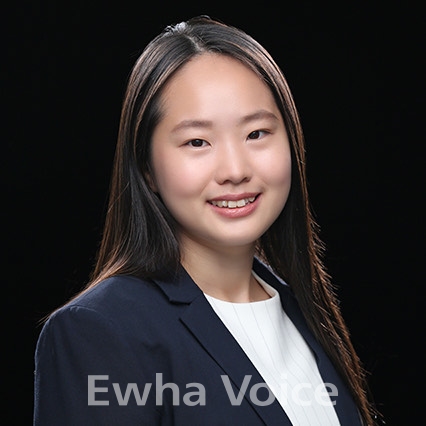
As an undergraduate student, Jiwon Jang, an alumna of Scranton Honors Program, always wanted to become a lawyer and naturally dreamed of entering law school. That dream was achieved when she successfully entered Harvard Law School and passed the bar exam. Based on her experience at Ewha and Harvard Law School, Jang revealed her special journey of becoming Korean transactional lawyer at an American law firm.
Jang was born in the United States but soon moved to South Korea, which always made her dream of going back. “I only have a vague memory of living in America, but my older sister missed her life as an elementary student in the States,” she said. “This naturally led me to dream of living outside of South Korea and getting a job there,” she said.
The idea of attending law school first sparked when Jang started thinking about her career during her undergraduate years. She was attracted by the fact that studying law would open herself to various career paths. Moreover, ever since she was a child, her parents and people around her had always praised her for talent in public speaking, naturally recommending her to become a lawyer in the future.
Jang chose an overseas law school instead of Korean law school after taking into consideration of quality life. In South Korea, law school entrance is more difficult and fierce compared to ones in the United States. Moreover, the greatest benefit she could get from attending a law school outside of her home country is that she does not have to merely stick to South Korean law firm and could broaden her perspective as a lawyer. Since South Korea also has a high demand for foreign legal consultants, she thought that entering law school in the United States could expand her capacity to work in either countries in the future.
Preparing for a law school in the United States made her life as an undergraduate different from those who prepared for Korean law schools. While law schools in South Korea require students to build law-related knowledge and experience starting from their undergraduate years, that was not mandatory for ones in the United States.
“Thus, I tried to do English-related activities in my undergraduate years, such as working as an Ewha Voice reporter, partaking in exchange school programs, and registering for English courses,” Jang said. “In my cover letter, I put forth my ability to embrace racial diversity and my potential to work overseas.”
Jang currently works as a transactional lawyer and mainly helps businesses make deals. As a lawyer who has worked in a law firm for only two years, she usually listens to the guidance of her seniors and works on drafting contracts and documents required for deals, making her daily routine unpredictable. Usually the more experience a lawyer has, the more predictable the day will be.
“I am proud of myself when I feel like I am doing better than before and learning more about this occupation,” she said. “When my client says ‘thank you,’ that is the moment when I feel the most pleased.”
In terms of cultural challenges, Jang mentioned micro-aggressions.
“Passive aggression might seem like a minute and insignificant issue, but it is something hard to ignore as a Korean living in the United States,” Jang said. “For example, people frequently mispronounce my name just because I am Asian. Although it may not be completely intentional, it is hurtful from time to time since there is still a certain amount of racism applied.”
But the fact that the United States is where people are able to speak up and fight against racism made her relieved.
Jang shared her personal goals as a lawyer, which she is still thinking about. She began her journey with the aspiration of becoming a lawyer who could change the world. However, her ideals and the reality were different, which created some barriers and inconsistency.
What Jang wants to achieve in the long run is something she should always deeply think about.
“Before attending a law school, there was a set schedule for me, but now, it is my responsibility to decide what to do in the future,” she said. “There are friends who are working at a completely different field and some become an in-house lawyer, so I am still in the process of figuring out what I want to do.”
For now, Jang wants to do something meaningful and hope to receive motivation from her surroundings in order to set a goal and pave her career path.

